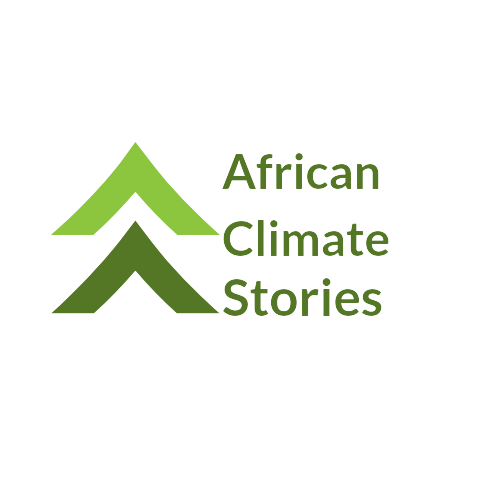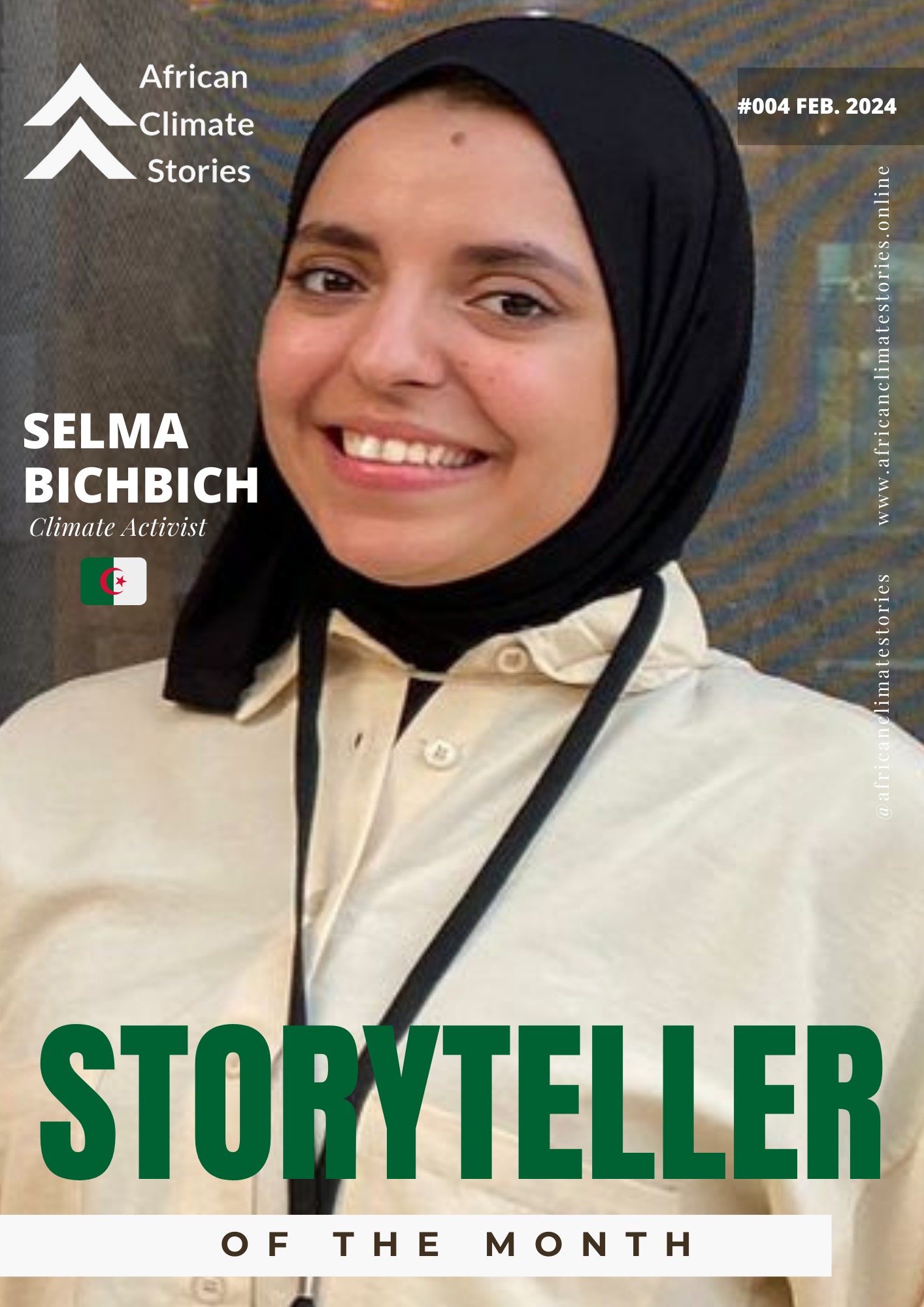Our climate storyteller of the month, Selma Bichbich is a passionate social and climate activist from Algeria. She is the founder of a national NGO called “Together for Blue and Green,” which is dedicated to environmental conservation and sustainable practices. She is also the co-founder of the esteemed regional network, “MENA Youth Network,” which fosters collaboration and knowledge exchange within the MENA region.
Selma’s commitment to environmental causes extends beyond her national and regional involvement. She serves as the Focal Point of the environment and human rights thematic group at the Major Group for Children and Youth (MGCY), where she advocates for the intersection of environmental protection and human rights issues. Ms. Bichbich holds a pivotal position as a board member at “ProVeg,” an organization focused on promoting plant-based diets and sustainable food systems. She is also the project coordinator of the “MENA Coalition for Peace and Security,” where she works toward regional stability through environmental awareness and peace-building initiatives.
She was funded by UNEP to represent Algeria and the North African region at the SAICAM IP4.2 conference in Nairobi, Kenya, at the conference, she was able to address the devastating impact of chemicals in countries like Algeria, which has a long-standing issue with a contaminated valley since colonization, and highlighted the tragic explosion in Beirut, Lebanon, caused by unstudied chemicals.
As an event organizer, Selma has achieved remarkable outcomes, through organizing the successful inaugural edition of the “MENA Youth Environmental Assembly ” in collaboration with YOUNGO and MGCY, supported by the Swedish Institute’s funding. This assembly served as a vital platform for young environmental activists from countries of wars and crises in the MENA region to come together, share ideas, and advocate for impactful change.
Currently, Selma is spearheading an essential campaign at the AUB to ban plastic bottle usage within the campus premises, in her vision, the university will provide sustainable alternatives through water fountains, thereby reducing plastic waste and promoting a more environmentally friendly campus environment. Selma’s ultimate goal is to transform this campaign into a university policy, ensuring lasting change and sustainability.
Recognizing the importance of broadening her perspective and knowledge on climate issues, Selma has decided to pursue an internship with the “FLC Climate Justice Internship.”, aiming to deepen her understanding of addressing climate challenges through a filicidal perspective and learn innovative ways to connect these issues with her local community in Algeria.
What personal experiences sparked your passion for climate activism?
My journey into climate activism was ignited by witnessing the direct impacts of environmental degradation in my home country, Algeria. The moment that stands out was seeing the consequences of the contaminated valley, a lingering issue since colonization. This not only showed the environmental damage but also highlighted the interconnectedness of human rights and environmental health. My dedication is further fueled by the broader challenges faced by the MENA region, from water scarcity to the aftermath of environmental disasters, like the Beirut explosion. Let alone, the inspiring work that my grandparents have taught me through their green farming eco-friendly style and practices.
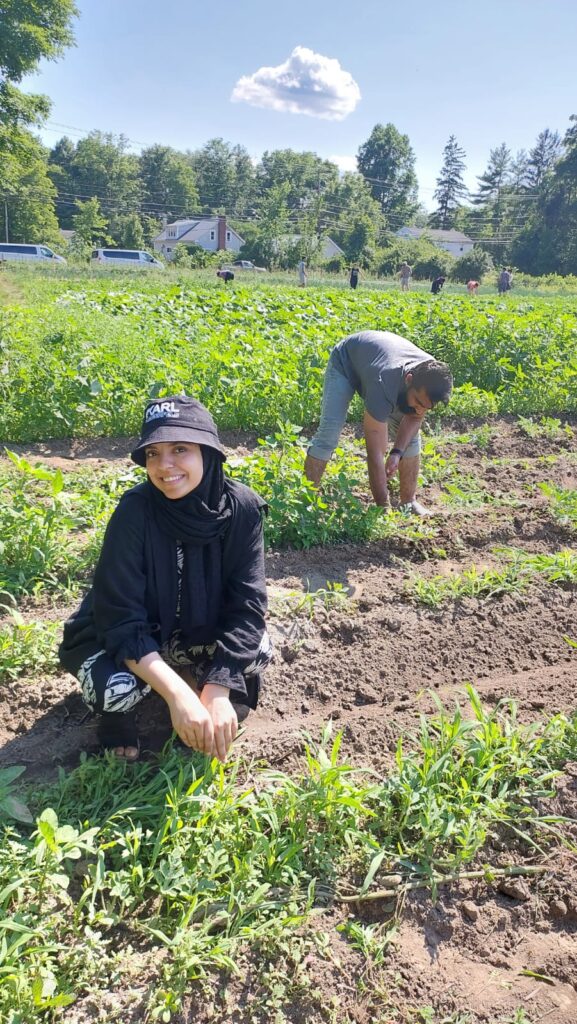
African Climate Storyteller Selma Bichbich
How do you believe storytelling can effectively communicate the urgency of climate change?
I believe storytelling is a powerful tool to convey the urgency of climate change because it humanizes the abstract and often overwhelming data surrounding this issue. Stories can bridge the gap between knowledge and emotion, compelling people to act by connecting them personally to the cause. In fact currently I am also leading a project where I do showcase stories of different youth female climate activists from the MENA region with Girls Rising.
Can you share a specific moment where you witnessed the impact of climate change, inspiring your commitment to advocacy?
An especially poignant moment that deepened my commitment to climate activism occurred during my participation in COP28. There, I had the privilege of speaking out on the intersection of justice, climate change, and conflicts, with a particular focus on the injustices occurring in Palestine. The opportunity to moderate a significant side event was a highlight for me. This event brought to the forefront the profound impacts of conflict on the environment and the formidable challenges faced by youth advocates striving for change in such conditions. It was an emotional experience, not only due to the gravity of the subjects discussed but also because of the shared determination and resilience demonstrated by participants. This occasion underscored the critical need for global cooperation in addressing the environmental consequences of conflict and the importance of supporting youth-led initiatives in these efforts.
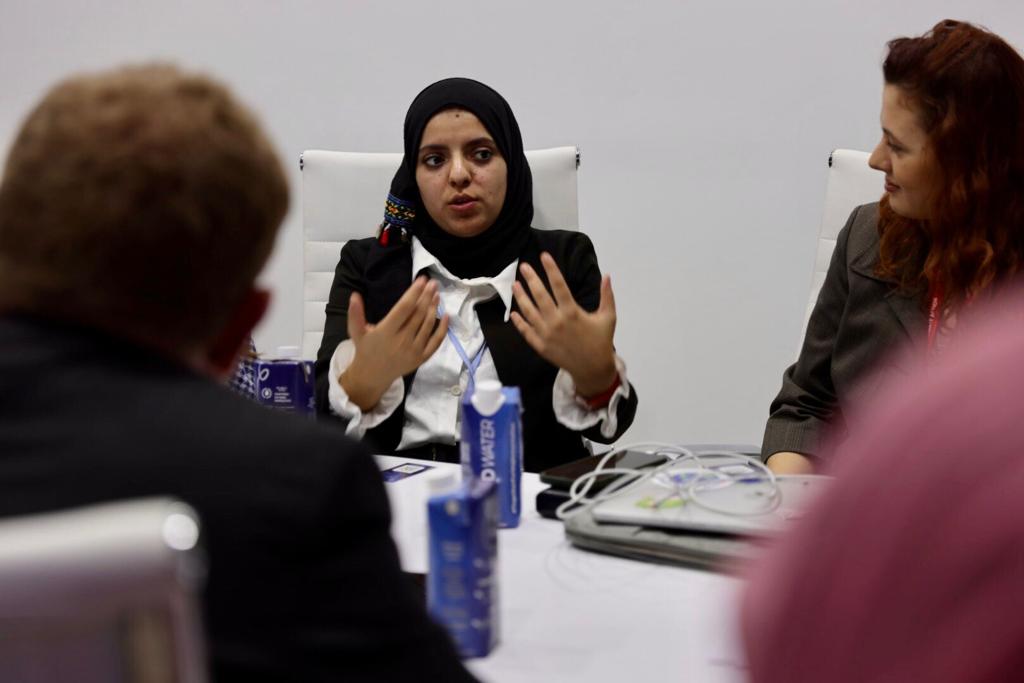
Selma Bichbich at COP27 World Bank meeting
For those looking to use storytelling in climate advocacy, my advice is to start with personal experiences or local stories. These narratives can be incredibly powerful in illustrating the broader climate crisis. It’s also important to be authentic and factual, ensuring your stories resonate and motivate.
Selma Bichbich
CLimate activist from Algeria
To engage audiences effectively on climate issues, I rely on a mix of personal narratives, visual storytelling, and data-driven storytelling. Personal stories create a connection, visuals leave a lasting impact, and data provides the credibility and urgency needed to inspire action, particularly when you link it back to specific movements, struggles, and to you as an activist trying to just leave something to your community.
How do you balance conveying the severity of climate change with inspiring hope and action in your stories?
In my storytelling, I aim to strike a balance by presenting the stark realities of climate change while emphasizing actionable solutions and showcasing examples of successful environmental stewardship. This approach ensures that the narrative remains hopeful and empowering.
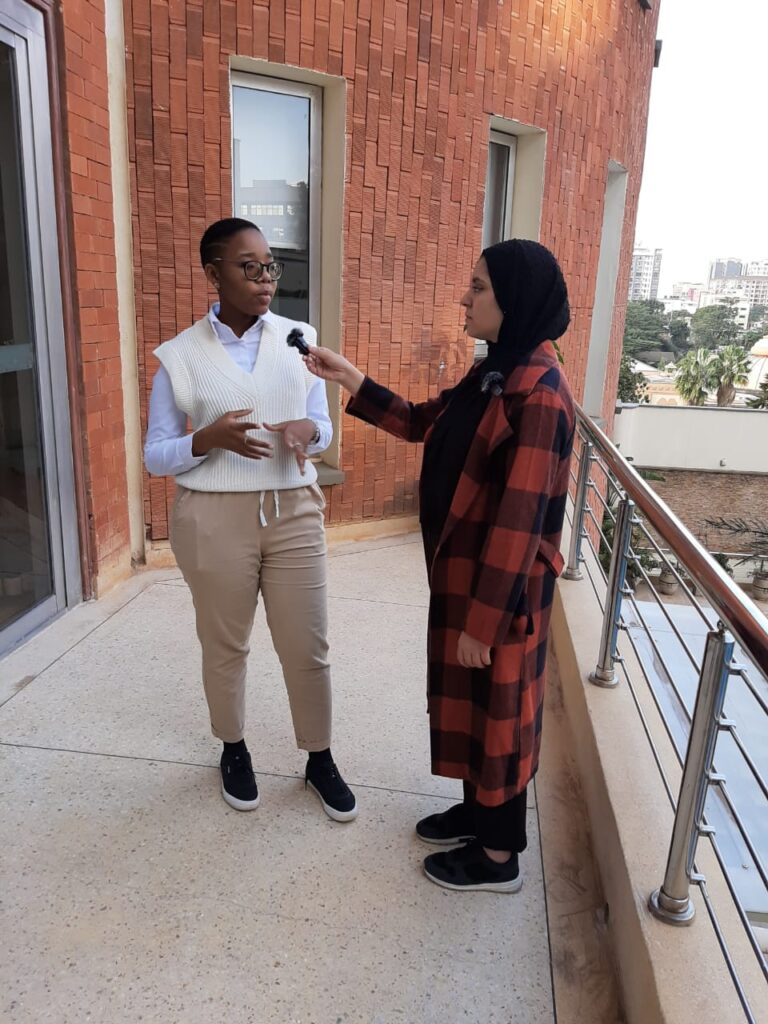
Selma Bichbich at IOM Forum
A particularly significant achievement was the launch of the inaugural MENA Youth Environmental Assembly. In this event, we not only utilized storytelling to spotlight the environmental challenges and the resilience of youth in conflict-affected areas, but we were also able to directly support positive change by sponsoring five green projects across the MENA region. This was made possible through the generous financial backing of the Swedish Institute and Peace First. Additionally, my organization, Together for Blue and Green, took a pivotal role by hosting the first edition of the Local Conference of Youth (LCOY) in Algeria. This milestone event not only amplified our contributions to the environmental movement but also established us as a leading collaborator at the MENA Regional Conference of Youth (RCOY).
The assembly and these subsequent initiatives fostered a profound sense of unity and determination, driving increased awareness and catalyzing collective action within the region. The success of these efforts reflects the power of collaborative engagement and the vital role of youth leadership in the global fight against climate change.
For those looking to use storytelling in climate advocacy, my advice is to start with personal experiences or local stories. These narratives can be incredibly powerful in illustrating the broader climate crisis. It’s also important to be authentic and factual, ensuring your stories resonate and motivate.
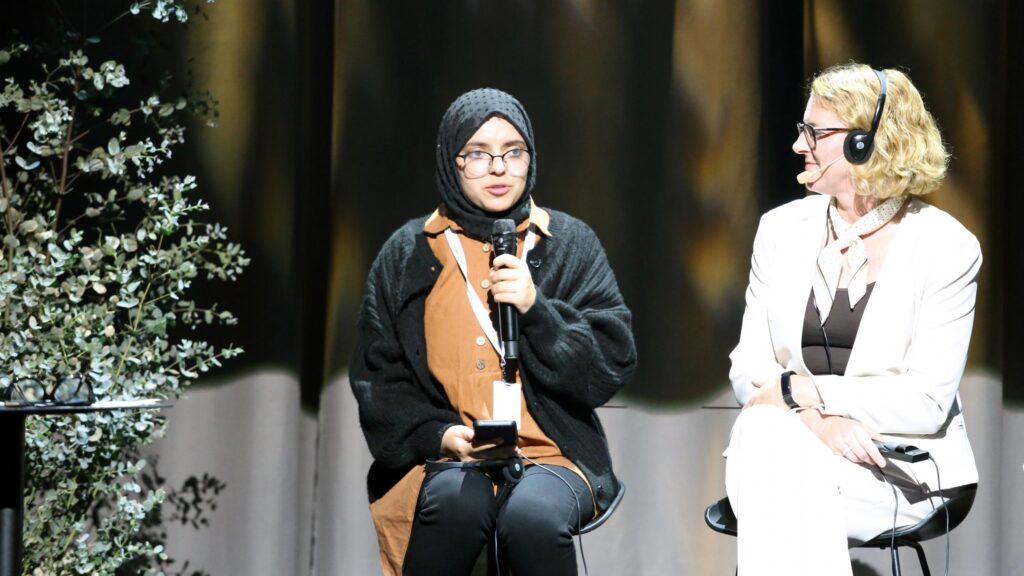
Selma Bichbich at Stockholm+50 conference
How do you navigate communicating complex scientific concepts in a way that resonates with a broad audience?
Navigating complex scientific concepts involves simplifying information without losing its essence. Using metaphors, analogies, and relatable examples can make these concepts accessible and engaging to a broad audience, please always keep a note of simplifying the terms as much as you can after all activism work is about having everyone involved and we want to ensure that it is a place for everyone to contribute.
What role do diverse voices and perspectives play in effective climate storytelling and how do you personally cope with the emotional toll of engaging with the challenges posed by climate change in your storytelling?
Diverse voices and perspectives are crucial in climate storytelling. They enrich the narrative by bringing in a range of experiences and solutions, highlighting the global nature of the crisis while respecting local contexts and knowledge, and the best part is having diversity in region, gender, culture, and perspectives.
Coping with Emotional Toll The emotional toll of climate change storytelling is significant. I cope by focusing on the positive impact of my work, connecting with a supportive community, and engaging in self-care practices. It’s important to find balance and remain hopeful.
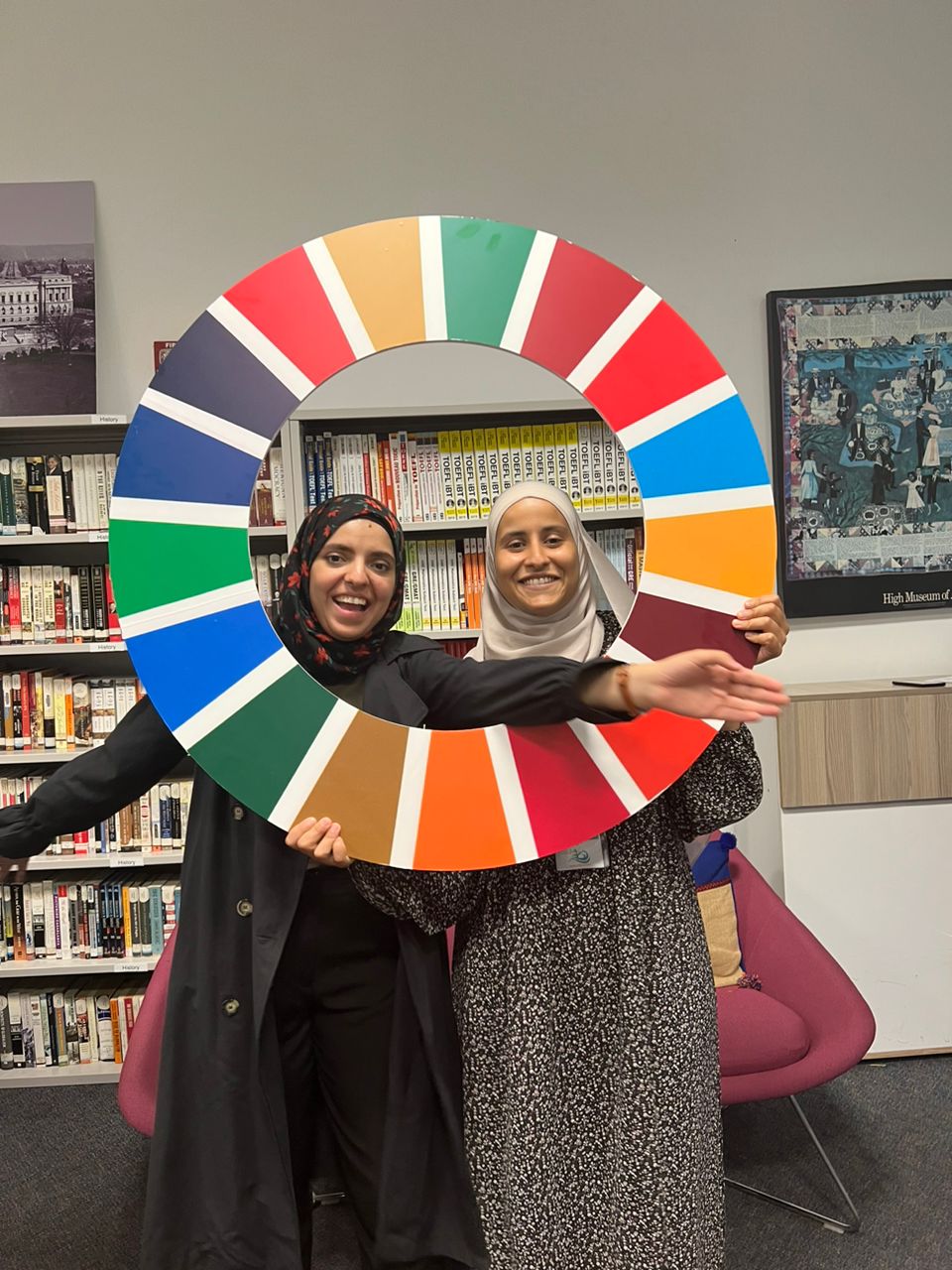
What advice do you have for young people who want to venture into environmental and climate change storytelling?
To all the young, vibrant souls eager to make a difference through environmental and climate storytelling, let your curiosity be your compass and your diligence your map. Dive deep into research, immerse yourself in the heart of your community, and let the fire of your passion ignite a collective movement. Each story you tell is a beacon of hope, a call to arms in the noble quest to safeguard our planet.
Your voice is not just important, but essential…
Stand tall, speak loudly, and let the power of your narratives inspire action, transform hearts, and mobilize a global community. This is your moment. Embrace it with all the fervor and emotion you possess, for together, we can and will make a difference. AND PLEASE NEVER be embarrassed of your country’s challenges and struggles never be ashamed of what you have to address no matter how painful it is, because it is and we are all in this together but that what we call fight back…call to action and just ACTIVISM DUTY!
We hope you enjoyed this piece.
If you will like to be featured as one of our Climate Storyteller’s of the month? Kindly use this link to indicate interest or share with friends who qualify: African Climate Stories – Storyteller of the Month.
